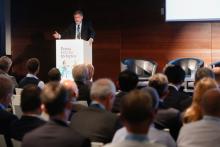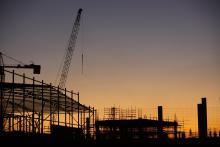The “Construction 2050: Building tomorrow’s Europe today” initiative has been authored by a range of major European construction industry organisations including
Construction 2050 calls for a single political responsibility to be established within the European Commission for the built environment in Europe and ensure that all relevant Directorate Generals are involved in future construction policy initiatives.
The stakeholders say that the existing Construction 2020 initiative needs reinforcing in order to successfully adapt to the evolving challenges the sector faces.
The Construction 2050 policy document states that sector policy must respond to forthcoming changes in people’s lifestyles, and that by 2050 around 75% of the EU population will be living in urban areas, in smart cities with energy efficient and accessible buildings, made by more efficient products and appliances.
It adds this means that communication technologies will have produced a paradigm shift in our daily life. City planning, autonomous transport systems, new delivery technologies, “mobility as a service” such as car and bike sharing services, and alternative working schemes such as teleworking will have completely changed the way in which people and goods move and interact. The policy document says that smart infrastructure, constantly connected to our transport, will have improved and made safer the mobility of people and goods across the EU, thereby improving the competitiveness of our economies and our wellbeing.
Construction 2020 calls for a specific targeted approach to construction because the stakeholders say the sector is at the crossroads of different value chains and its unique nature requires a unique approach.
It also seeks an adaptable policy framework to address the evolving construction ecosystem and the transformation of the industry, in addition to a holistic approach towards policy making in order to implement coherent and balanced policies and legislation.
Finally it calls for a strong partnership between the European institutions, the Member States and construction social partners and stakeholders to steer the transformation of the sector with the most adequate policies and tools.
CECE president Enrico Prandini commented on the new initiative: “By optimising the way construction works thanks to the development of a new inspiring and relevant policy framework, we will improve the lives of European citizens by providing higher value with fewer natural resources; and higher quality assets for owners and users. Construction is the solution industry. Addressing the challenges that the construction sector is facing means addressing the challenges of European citizens.
"The sustainable Europe of tomorrow cannot be achieved without the construction sector. All the actors in the construction process must be involved for the European Union to respond to its main challenges: competitiveness, youth unemployment, digital economy, urban regeneration, energy efficiency and energy poverty, circular economy, affordable housing, climate change, mobility and connected infrastructure etc."
Prandini added that European citizens spend over 90% of their time indoors, meaning that their health and well-being strongly depends on how buildings are built, maintained and renovated.
"It is within this context that construction stakeholders call upon the European Commission to strengthen the current construction policy setting by creating a new vision for the built environment: “Construction 2050: Building tomorrow’s Europe today,” he said.









